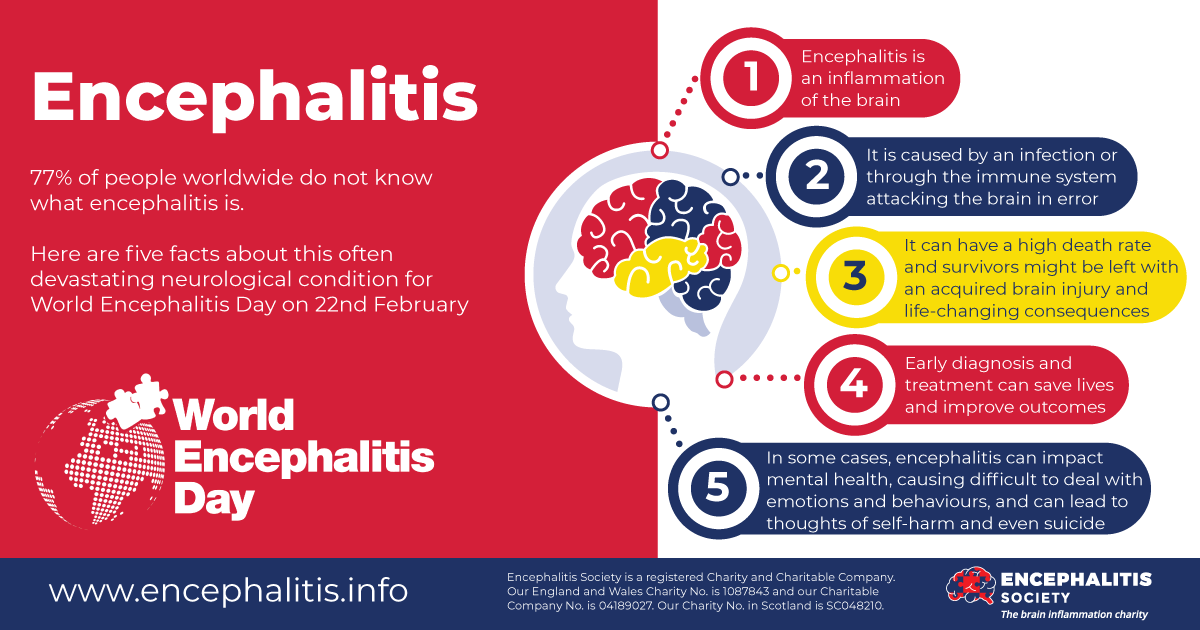Today is the 10th anniversary of World Encephalitis Day, every year encephalitis is recognised on 22 February. Encephalitis is a code red condition, showing the need to raise global awareness – so today help to turn the world red by lighting up as many landmarks as possible!
What is encephalitis?
Encephalitis is an inflammation of the brain that can be caused by an infection (infectious encephalitis) or through the immune system (post-infectious or autoimmune encephalitis) attacking the brain. Encephalitis can affect anyone – regardless of age, gender or ethnicity. Here are five facts you should know!
Signs and symptoms
Infectious encephalitis usually begins with a ‘flu-like illness’ or headache whereas autoimmune encephalitis often has a longer onset. The symptoms can be rapid but may also take days, sometimes weeks to appear. The most common symptoms are headache, confusion, drowsiness, fever, seizures, memory problems, altered personality or uncharacteristic behaviour or the inability to speak or control movements.
Recovery after an injury to the brain can often take much longer than injuries to muscles or bones. That is why it is important to look at the role rehabilitation can play in helping people learn new skills and find coping strategies for any long term disabilities. Taking a holistic approach to rehabilitation ensures that the complex cognitive, behavioural, social, emotional and medical problems faced by people affected by encephalitis and their families are considered.
How can rehabilitation help?
Rehabilitation plays an integral role by removing barriers and encouraging people to exercise to help improve everyday tasks. Encephalitis can cause physical, cognitive and emotional symptoms. Depending on the severity of symptoms and the needs of the individual, rehabilitation interventions can help to:
- Improve physical function. Physiotherapy can help with strength, flexibility, balance, motor coordination and mobility through programmes that focus on exercise therapy, gait rehabilitation, the Otago programme and balance training.
- Improve cognitive function. Cognitive therapy can help improve memory, attention and other cognitive abilities through exercises and skills training.
- Manage mental health. Encephalitis can cause mood changes, depression, anxiety and other emotional and behavioural symptoms. Therapy strategies can help a person to develop coping skills to manage these symptoms.
- Adjust to lifestyle changes. Occupational therapy can help a person adapt to disability and changes in lifestyle through interventions that teach new skills, advise on assistive devices and learning strategies to manage every day tasks!
What can you do?
- You can help raise awareness of encephalitis by taking part in the Light up a Landmark Campaign. This is a global initiative – look out for a landmark near you!
- Join in the World Encephalitis Day 2023 fundraising challenge by going for a walk, jog or run (if you are feeling dynamic). The target is 500,000 steps in February, so no matter where you are join the BrainWalk and bring the world one step closer to learning more about encephalitis.
- To help raise awareness learn more about encephalitis on Physiopedia. As well as rehabilitation advice you can give, you will learn more about encephalitis, how it is diagnosed and the importance of rehabilitation.
- Shout about what you are doing and learning on social media, and don’t forget to use the hashtags #encephalitis #WorldEncephalitisDay #Red4WED
